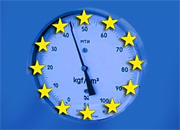Eurogas comments on European Commission’s proposal to amend EU Gas Directive
Options
Eurogas comments on European Commission’s proposal to amend EU Gas Directive

The European Commission submitted proposal to amend the Gas Directive 2009/73 / EC in November 2017 claiming that the decision to introduce them is being adopted "to improve the functioning of the EU internal energy market and enhance solidarity between Member States".However, according to Eurogas, this initiative could harm the industry, threatening both existing gas pipelines and new projects, including pipelines from the Eastern Mediterranean and the Caspian region.
Eurogas also notes that any changes in the Third Energy Package regarding the status of offshore gas pipelines still need to be assessed against potential incompatibilities with UNCLOS (UN Convention on the Law of the Sea).
Association believes that applying the Third Energy Package rules to the gas pipelines from third countries creates uncertainty for both the participants and consumers, and carries a potential threat to the existing contractual obligations. Retroactive changes in EU law affect the interests of existing and future gas suppliers and buyers who have concluded deals under the current legal regime.
If the European Commission initiative is implemented, a review of existing intergovernmental agreements will be required without guarantees that renewed agreements would still be mutually beneficial, and the sovereignty of EU member states in concluding future intergovernmental agreements will be curtailed.
Eurogas gives examples of existing pipelines, which legal regime will be affected by the European Commission’s initiative. These are: Medgaz (Algeria-Spain), TransMed (Tunisia-Italy), Green Stream (Libya-Italy), Maghreb-Europe Pipeline (Morocco-Spain), Europipe I+II, Norpipe (Norway-Germany), Nord Stream (Russia-Germany), Transmed Pipeline (Tunisia-Italy) and the United Kingdom pipelines (after Brexit).
Eurogas believes that the European Commission initiative aims to create benefits for the LNG import against the pipeline gas transportation. This creates risks for diversification of supply as well as for suppliers competition.